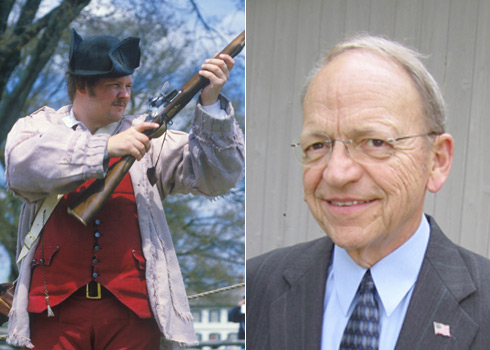As you may have seen, some Republican state legislators in South Dakota have proposed a sort of protest bill against health care reform — to require that nearly every adult in the state purchase a gun. But in their effort to make a statement about constitutionality, they might have just misfired.
“If the federal government can order every one of us to buy health insurance because we need medical care, it makes just as much sense for us to require everyone to have a weapon to provide for their protection,” the lead sponsor, state Rep. Hal Wick (R), told the Rapid City Journal.
At the same time, he added that he doesn’t really mean to pass this bill or get other people to vote for it: “I feel this would be overstepping the bounds of their personal rights.”
So I decided to ask Wick his opinion of a previous individual gun mandate, which was passed by…George Washington!
You see, back in the early days of this country, Congress passed and Washington signed the Militia Act of 1792, which provided for universal military training to be conducted at the state level.
Some key provisions:
That each and every free able-bodied white male citizen of the respective States, resident therein, who is or shall be of age of eighteen years, and under the age of forty-five years (except as is herein after excepted) shall severally and respectively be enrolled in the militia, by the Captain or Commanding Officer of the company, within whose bounds such citizen shall reside, and that within twelve months after the passing of this Act.
…
That every citizen, so enrolled and notified, shall, within six months thereafter, provide himself with a good musket or firelock, a sufficient bayonet and belt, two spare flints, and a knapsack, a pouch, with a box therein, to contain not less than twenty four cartridges, suited to the bore of his musket or firelock, each cartridge to contain a proper quantity of powder and ball; or with a good rifle, knapsack, shot-pouch, and powder-horn, twenty balls suited to the bore of his rifle, and a quarter of a pound of powder;
As Jeremy Singer-Vine at Slate noted this past December, the two acts are in fact not the same in their legal bases — the earlier one was based on the Militia Clause of the Constitution, while health care reform is based on the Commerce Clause. But if a person did think they were the same in the sense that they are both individual mandates, wouldn’t the 1792 law be a ready answer?
(As a bonus, here’s another fun difference: Low-earners didn’t automatically get subsidies to buy guns, like Obama et al. have done with health insurance. Instead, people were faced with an unfunded individual mandate, which could be quite onerous.)
So I called Wick, to ask his opinion. He affirmed to me that his bill is about making a statement. “The bill is really about Obamacare, and the fact that it’s unconstitutional.”
Does he think a gun mandate and the health care mandate are the same thing, I asked? “Yes,” he responded.
I then asked him whether he had an opinion on the gun mandate that was signed into law by Washington in 1792. “I wasn’t aware of it,” he said after a short pause. “Is it still on the books or has it been removed?”
I explained that the Militia Acts were amended many times over the course of this country’s history, and this provision was phased out a long time ago.
In the course of the interview, I asked whether this would change his opinion on individual mandates. “No,” he said. “I really don’t feel like a gun mandate would be constitutional under these circumstances.”
What does he mean by the circumstances?
“Well, it was shortly after the Revolutionary War, and it was before the War of 1812,” he said, “which may have been something that was on the radar screen — that they knew there could be another challenge coming from overseas. I’m not a history major, though.”









